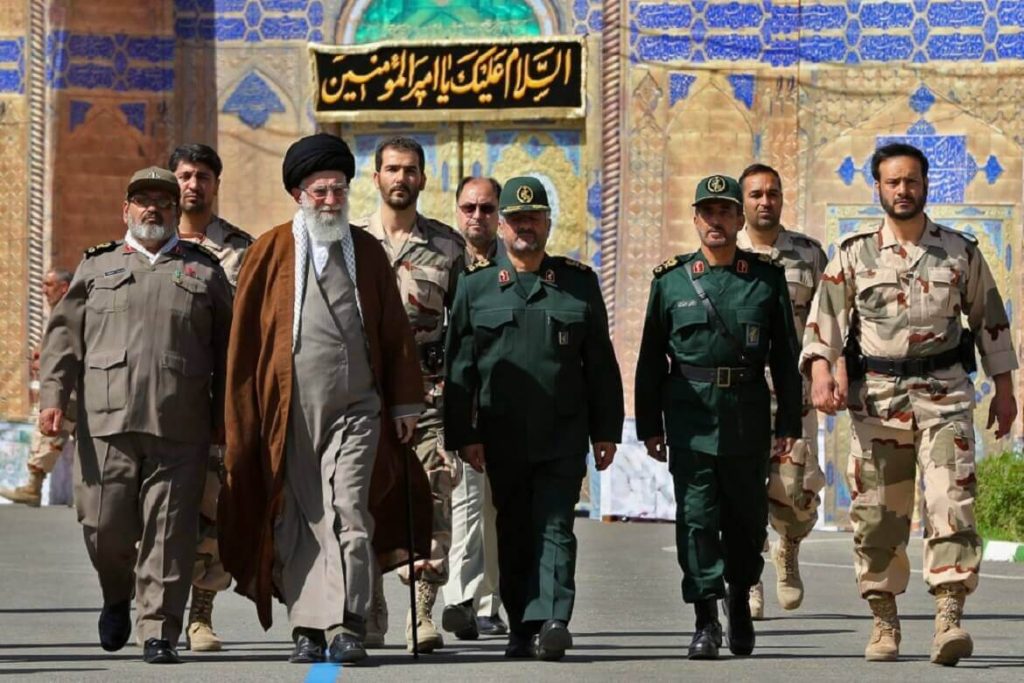By Anton Evstratov
At present, Iran’s policy is subordinated to two important tactical goals that have a chance of becoming strategic – on the one hand, maximizing the benefits of Israel’s military actions against Hamas, and on the other hand, avoiding a direct military clash with the U.S. and Israel.

Tehran is currently practicing the first case very successfully – the Hamas attack on Israel and the subsequent actions of the IDF not only drew attention directly to the Palestinian issue, but also to Iran as the main ally and supporter of the oppressed Palestinians. To this end, virtually all officials of the Islamic Republic made bellicose statements toward Tel Aviv, the pro-Iranian Hezbollah movement in Lebanon began shelling border military facilities and population centers, and Shiite militias in Iraq and Syria struck U.S. military bases with rockets.
The inclusion in the confrontations of the Ansar Allah group operating in Yemen immediately drew considerable publicity. Its fighters, known as the Houthis, fired several ballistic missiles at Israel. Despite the fact that most of the munitions were shot down without entering Israeli airspace, the media effect of the incident was enormous, as it demonstrated both the serious technical capabilities of the Yemeni movement (capable of launching Iranian-made missiles at a distance of 1600 km) and the organizational capabilities of Iran, which is able to mobilize the forces of various groups in the Middle East, including those located thousands of kilometers apart.
All this, as well as the obvious orientation of the Arab resistance towards Iran, which has greatly increased its importance in Palestine compared to the first years of the Syrian conflict, when, for example, even Hamas opposed Iran’s ally Assad and pro-Iranian groups, makes the Islamic Republic a necessary actor in the Middle East settlement. It is now obvious that stability and security in the region, even temporary and situational, cannot be achieved without Iran. Even the Americans are aware of this, according to some, though unconfirmed, data, which have already entered into direct negotiations with Iran.
At the same time, it is extremely important for the Iranian military-political leadership not only to reach the mentioned political and diplomatic heights, but also not to lose them by getting involved in an unproductive and pointless conflict with Israel or the United States at this stage. This is especially dangerous given the movement toward the Persian Gulf and even the entry of additional American naval, including aircraft carrier, formations into it. The latter, along with U.S. bases in Syria, Iraq, Pakistan, Turkey, and the Gulf States, are capable of delivering a strike against the IRI of such power that even its echeloned air defense system would most likely be unable to cope with, and that the Islamic Republic would most likely be unable to adequately respond to. Such a scenario would not only cast doubt on Iran’s political influence in the region, but would also damage its scientific and technological development, including its missile, naval and nuclear programs, setting them back for years.
Apparently, Iran is not ready to sacrifice its main outpost in the Eastern Mediterranean, Hezbollah, for the sake of unobvious and elusive goals in Palestine. Despite the many videos of the group’s fighters clashing with the Israeli military, these are still cross-border firefights – albeit with artillery, drones and ATGMs. Hezbollah’s offensive operation against Israel will inevitably lead to its retaliatory actions on Lebanese territory, which, given the difference between the military potentials of the Jewish state and the Arab Shiite movement, could become critical for the latter, as well as for Iranian military and political influence in Lebanon and its vicinity.
In this context, Hezbollah’s actions, the activities of other pro-Iranian groups and movements, and Iran’s own statements are nothing more than a cover for a pragmatic policy that implies Iran’s refusal to get directly involved in a major Middle East conflict. At the same time, according to the realized idea of the Iranian authorities, this cover should increase Iranian military-political capital not only inside the country, but also throughout the Middle East.
At present, one can trace a number of obvious achievements of Tehran in this field.
First, the Palestinian card has expectedly extinguished the remnants of intra-Iranian socio-political tensions. Meanwhile, the latter had been a rather painful issue, both against the background of unresolved contradictions following the “anti-Hijab protests” and due to economic problems and a drop in the country’s income in recent months.
Secondly, the Arab and Muslim world as a whole is becoming increasingly consolidated on the background of the Palestinian problem around Iran. This was demonstrated by the summit of the Organization of Islamic Cooperation and the Arab League, held in parallel in Riyadh, the capital of Saudi Arabia. Iranian President Ebrahim Reisi was not only invited to these events, but also held direct talks with the Crown Prince of Saudi Arabia – until recently the main regional adversary of Iran. These talks, first of all Palestine, imply the convergence of the positions of the two leading players of the Middle East on the one hand and the failure of plans to isolate Iran with the parallel establishment of diplomatic relations between the Arab monarchies of the Persian Gulf and Israel on the other.
Thirdly, despite its refusal to be directly involved in military actions in Palestine, Iran remains the most involved country of the Muslim world in this conflict. This not only makes Iran a necessary party to any negotiations on the Arab-Israeli settlement, but also gives it the opportunity to use the Palestinian issue for political pressure on the Arab states. For example, Vahid Jalalzadeh, head of the Iranian Majlis Commission on Security and Foreign Policy, recently complained that “the leaders of Muslim countries have no desire to work seriously on the issue of Palestine and the Gaza Strip”. This kind of pressure further expands the range of political maneuvering for the IRI.
The Islamic Republic will continue to develop the discourse of resistance, using the Palestinian issue as a tool of pressure not only against Arab countries, but also, for example, against neighboring Azerbaijan, which supplies Israel with up to 70% of the oil it uses. Moreover, the oil and gas blockade of Israel is currently the focus of Iranian foreign policy discourse. However, Iran has neither the economic interest of the selling countries (including Arab countries such as Egypt) nor its own power resources to organize such a blockade.
It seems that this stage of tension is used by Iran as a preparation for more serious levels of confrontation, the time for which Tehran will try to postpone for the time being.
Author: Anton Evstratov (Russian historian, publicist and journalist living in Armenia, lecturer at the Department of General History and Foreign Regional Studies of the Russian-Armenian University in Yerevan).
The views expressed in this article are those of the author alone and do not necessarily reflect the views of World Geostrategic Insights.
Image Credit: Office of the Iranian Supreme Leader via AP







